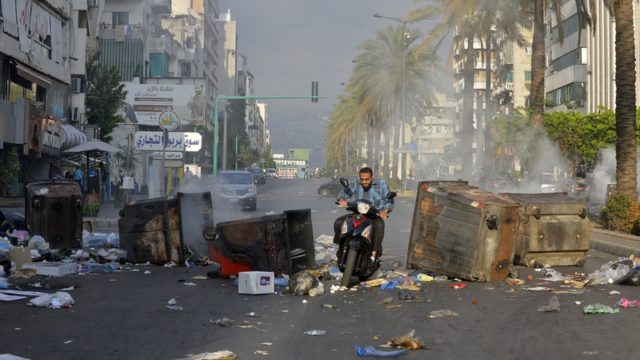
Beirut International Airport had a power outage, forcing at least one plane to abort its landing. Word is the airport will be subjected to periodic outages, but perhaps with more warning next time.
Lebanon, a once-lovely, once-prosperous country, is now an insolvent pit that has defaulted on a series of Eurobond payments and is likely to miss more. The Syrian civil war, Hezbollah’s capture of the south and installation of tens of thousands of missiles aimed at Israel, COVID-19, a terrorist-dominated government in Beirut and general governmental incompetence—plus corruption—all contributed.
And the Lebanese people are tired of it. Angry demonstrators took to the streets beginning last October to protest their government and, while they were shut down for a time during the COVID-19 pandemic, they’re now back in force. Only days ago, the patriarch of Lebanon’s important Maronite Church called for the restoration of Lebanon’s “regional neutrality” and blamed Hezbollah-generated “endless wars” for the economic disaster. As reported by Al Arabiya, Patriarch Beshara Al-Rai also said national defense should be the job of the Lebanese Armed Forces (LAF).
Probably not coincidentally, on Monday Hezbollah operatives crossed the border into Israel and were thwarted by the Israel Defense Forces. Hezbollah has long been probing Israeli defenses, and Israel found and destroyed cross-border tunnels in the spring. It is possible that the action was designed to raise the price for Israeli strikes in Syria, as the Syrian government is unable, and the Russian government appears unwilling, to stop Israeli action against Iranian facilities there. The current belligerence, however, may also be tied to Beirut’s ongoing financial crisis and the inability of the government to address it. Ratcheting up pressure and appealing to Lebanese “patriotism” against Israel is a time-worn excuse for violence.
And violence cannot be separated from the financial disaster.
The feud between Central Bank chief Riad Salame and Hezbollah, which runs the Finance Ministry, is competition over control of what assets remain. Since the Lebanese government has been unable to create a budget or otherwise run the country, Salame has been printing money and valuing assets in ways central bankers rarely do, according to a report in the Financial Times. Because of that, the government has been unable to organize a unified position to enable it to meet with the IMF and its lenders. Said one senior source, “There’s no [Lebanese] consensus on the diagnosis, so what can they possibly negotiate?” In fact, two members of Lebanon’s financial team quit over what they described as attempts to paper over huge financial losses.
Any IMF or Eurobank conversation about Lebanon’s finances should include a nod to the U.N. Trusteeship Council—a presently inoperative body designed to “administer and support the transition to independence and self-governance of the colonies.” According to the website maintained by FlU, “When the U.N. was founded, there were parts of the world without a functioning government.” And so it remains—Lebanon, a former French colony, became independent in 1943, but Syria maintained troops there until 2005 and did not recognize Lebanese sovereignty until 2008. In the meantime, the PLO ran a state-within-a-state in the south from the late 1960s until 1982, and Hezbollah has run the Iranian franchise since 2000—not withstanding U.N. Resolution 1701, which forbade weapons other than those of the LAF south of the Litani River.
Lebanon’s debt is now $90 billion—a debt to GDP ratio of 152 percent—and 48 percent of the people are estimated to be below the poverty level. There are 800,000 state workers in a country of six million people, and the state is printing local currency to pay them. But the Lebanese pound, with an official rate of 1,500 to the U.S. dollar, is going for 5,000 to the dollar on the black market; some reports had it at 9,000 to the dollar in late July. It hardly matters—there is nothing to buy because there is no money for imports. Food, medicine and other essentials simply aren’t there.
“We understand Lebanon is in desperate need for an infusion of cash. They need investors,” U.S. Ambassador Dorothy Shea told Saudi-owned TV station Al-Hadath. But after Lebanon’s default, “investors are not lining up at the door.”
Russia’s ambassador said Russia, China, Syria, Iran and Iraq are willing to “help” Lebanon. Such help, said Ambassador Shea, might come “at the expense of the country’s prosperity, stability or fiscal viability, or, of course, the long-standing relations with the United States.” She was promptly banned from giving interviews by a Lebanese judge. However, General Kenneth McKenzie, head of the U.S. Central Command, then arrived in Beirut to meet with the U.S.-armed and trained LAF. Asked about the possibility of Chinese resources for Lebanon, the uncensored McKenzie replied, “You get what you pay for. That’s all I have to say.”
When a company or a person files for bankruptcy, the courts take over. The debtor no longer has a say in the restructuring of the finances or how the creditors are repaid. Certain debts cannot be erased, and new credit to cover up the old is forbidden. Creditors rule.
It sounds like a plan.
But Lebanon needs more. Lebanon still needs a chance to transition from its old French colonial status to an independent country.

